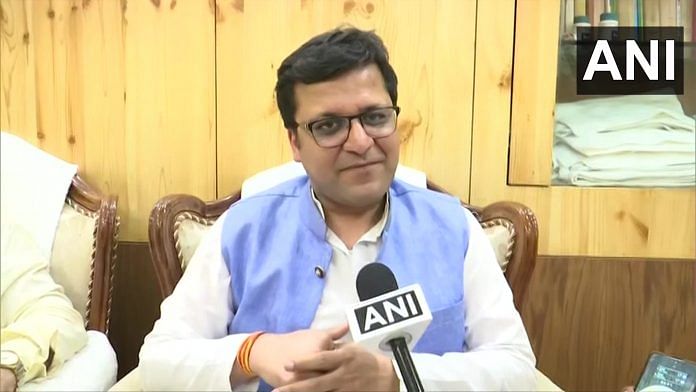Lucknow: The BJP-backed Samajwadi Party (SP) rebel MLA Nitin Agrawal was Monday elected as the deputy speaker of the Uttar Pradesh assembly. Agrawal secured 304 votes, while the SP’s Narendra Verma managed just 60 of the 364 valid votes cast.
With Agrawal’s election, the UP assembly has got a deputy speaker after 14 years. The last deputy speaker was the BJP’s Rajesh Agarwal, who was elected unopposed in 2004. His term ended in 2007.
According to political experts, the deputy speaker’s role is to conduct proceedings of the house in the absence of the speaker. Traditionally, leaders from an opposition party are handed this post.
The BJP, however, pushed for the elections even though the term of the current assembly is set to end in six months.
Sources in the party said there were a number of reasons as to why the party ensured Agrawal’s election.
A senior UP BJP functionary told ThePrint that the chief reason behind conducting the elections was to expose the opposition’s unity or lack of it.
The functionary said that the Congress boycotted voting, while some BSP MLAs also stayed away, which clearly shows that SP is alone.
“We were targeting the Samajwadi Party because Akhilesh Yadav has several times said that many BJP MLAs are in touch with him. So, where are they now?” he asked. “The BJP backed candidate got above 300 of the 364 votes polled. The SP’s candidate got just 60 votes. Politics is all about messaging. We have shown what we are capable of. We are still on top in terms of numbers.”
In his address after the result, Chief Minister Yogi Adityanath also attacked the SP, saying the election had exposed the fallacy of opposition unity.
“The opposition including the Samajwadi Party could not show unity even in the election of the deputy speaker,” he said. “This result is a clear indication of what is to come in the 2022 assembly elections.”
Yogi also said that the BJP waited for a full four-and-a-half years, but the SP did not put forward any names for the deputy speaker post. He added that “technically” Nitin was still a member of the SP and thus the BJP had followed the traditions of the house.
Also read: Lawyer shot dead in Shahjahanpur court, opposition alleges ‘no one is safe in UP’
Looking to woo rebels, independents & baniyas
A second BJP functionary said that the party was looking to woo other independents and rebels.
“By giving Nitin a post, we have garnered a soft spot in the minds of rebels and independent candidates. Though the Congress boycotted the polls, their rebel MLA Aditi Singh turned up for voting,” the functionary said. “Some independents also voted for us. One BSP MLA also voted for us.”
A third BJP leader said that if the party had not accommodated Nitin Agrawal, he may have gone back to the SP.
“If we had not made Nitin as the candidate he might have gone back to SP,” the leader said. “We have not given any important role to his father also as of now. We haven’t sent him to the Rajya Sabha again.”
Nitin is a three-term MLA whose father and former Rajya Sabha member Naresh Agrawal joined the BJP before the 2019 Lok Sabha elections.
The state assembly speaker had recently rejected an SP application to disqualify Nitin Agrawal from the House, for defying the party whip against attending a special assembly session in 2019.
Several BJP functionaries also hinted that caste equations also played a role in the election.
Nitin Agarwal is a baniya and comes from the business community.
“After the Gorakhpur incident (where a Kanpur businessman was killed in a hotel), there was anger within the community against the government and so to counter it, we have backed a baniya MLA for the deputy speaker post,” said a fourth BJP leader. “Baniyas are above 3 per cent of the population in central UP. They are traditional voters of the BJP and so we don’t want to lose them.”
Autocracy, says SP
The Samajwadi Party has, however, described the election as another instance of autocracy prevailing in the state.
“We all know that deputy speakers are generally from the opposition party. We have requested several times in the Vidhan Sabha for the polls to be conducted for the post, but they (government) did not respond. Now suddenly just before the assembly elections, they have backed a rebel MLA who has nothing to do with SP now. It clearly shows BJP’s mindset of autocracy,” said SP MLC and party spokesperson Sunil Singh Sajan.
Political analyst S.K. Dwivedi, a retired professor in political science from Lucknow University, said the BJP was only looking to gain political mileage out of conducting elections for the post.
“It’s a Constitutional obligation that the post of speaker and deputy speaker be filled but nowadays everything is being done by political consideration and not by constitutional morality,” he said. “This is shown in the fact that this post (deputy speaker) has been vacant for 14 years.”
(Edited by Arun Prashanth)
Also read: SBSP chief Rajbhar hints at renewing alliance with BJP for UP polls, but conditions apply



